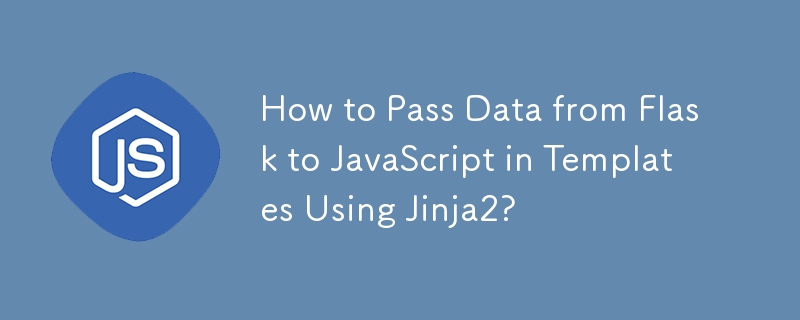

Passing Data from Flask to JavaScript in Templates
When fetching data from an API in a Flask application, there may be a need to pass that information to JavaScript in the corresponding template. This article explores how to achieve this by leveraging the power of Jinja2 templating.
In Flask, the render_template function allows us to pass variables to HTML templates. However, to make these variables available in JavaScript, an additional step is required.
Jinja2, the templating engine used by Flask, provides syntax that enables the embedding of Python expressions within templates. This means that we can use {{ variable }} anywhere in the template, including within JavaScript scripts.
For instance, consider the following Flask route that retrieves coordinates from an API:
<code class="python">@app.route('/')
def get_data():
events = api.call(get_event, arg0, arg1)
geocode = event['latitude'], event['longitude']
return render_template('get_data.html', geocode=geocode)</code>In the corresponding template, we can pass the geocode variable to JavaScript like so:
<code class="html"><script>
var someJavaScriptVar = '{{ geocode[1] }}';
</script></code>This allows us to access the value of geocode[1] as someJavaScriptVar in our JavaScript code.
Alternatively, to pass the geocode variable as an array, we can generate the array definition in the template:
<code class="html"><script>
var myGeocode = ['{{ geocode[0] }}', '{{ geocode[1] }}'];
</script></code>Jinja2 also supports more advanced constructs, such as loops and if statements, which can be used to simplify the generation of complex data structures.
Furthermore, the tojson filter can be employed to convert the geocode tuple to a JSON string, making it more suitable for use in JavaScript:
<code class="html"><script>
var myGeocode = {{ geocode | tojson }};
</script></code>With these techniques, developers can seamlessly share data between Flask and JavaScript, enabling interactive and dynamic web applications.
The above is the detailed content of How to Pass Data from Flask to JavaScript in Templates Using Jinja2?. For more information, please follow other related articles on the PHP Chinese website!
 What drawing software are there?
What drawing software are there?
 Recommended order for learning c++ and c language
Recommended order for learning c++ and c language
 How to withdraw money on WeChat without handling fees
How to withdraw money on WeChat without handling fees
 The performance of microcomputers mainly depends on
The performance of microcomputers mainly depends on
 How to use jsp programming software
How to use jsp programming software
 The Metaverse recognizes the top ten potential coins
The Metaverse recognizes the top ten potential coins
 How to delete a folder in linux
How to delete a folder in linux
 What to do if 302 found
What to do if 302 found
 what is ed
what is ed




